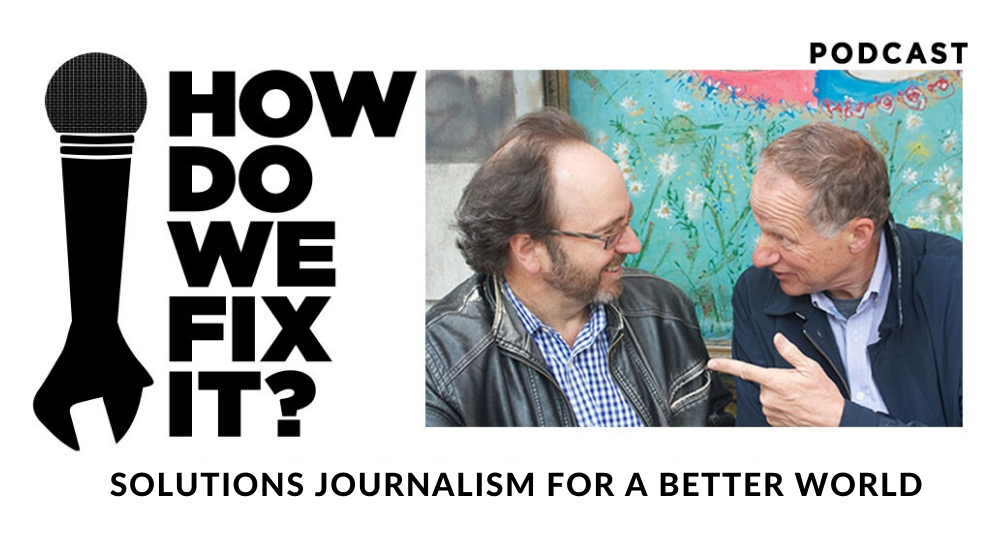Gerrymandering, low turnout elections, negative campaign ads, and increased polarization are all part of the flawed, fractured U.S. political system. Here we examine the case for constructive changes to how candidates for public office are elected.
Our guest, Rob Richie, has been the leader of the non-profit advocacy group, FairVote, since co-founding the organization in 1992. He has been involved in helping to develop and implement: Ranked Choice Voting in several states and more than 20 cities, fair representation voting systems in numerous states, Voting Rights Act cases, the National Popular Vote plan in 16 states, and voter access proposals like voter preregistration and automatic voter registration.
"We're in a winner-take-all environment and it's incredibly tense," Rob tells us. The current voting system allows for only one choice, which can add to bitterness and deep division. "Ranked Choice Voting gives the voter a chance not only to just put an X next to one candidate but to make a series of choices."
Read moreThe huge difference between slogans and solutions is a key theme of this episode. While demands to “de-fund the police” or replace entire police departments with something new might sound good in theory, these ambitious experiments in public safety may backfire.
Our guest is Minneapolis civil rights lawyer and activist Nekima Levy Armstrong. Her recent New York Times op-ed— “Black Voters Want Better Policing, Not Posturing by Progressives”— was written after the defeat of a November ballot initiative that would abolish the Minneapolis Police Department and replace it with a department of public safety. She expressed frustration over the lack of a detailed, well-researched plan.
While white progressives mostly voiced support for the proposal, majority-black neighborhoods rejected it. We find out why.
Read moreNever before in living memory has America been as politically polarized as it is today. We are divided by our politics, Facebook and other social media sites, and by news media. Nearly half of us have stopped talking with someone about political topics as a result of what they said in person or online. Our culture of contempt is dividing us all and making America ungovernable.
How do we use science and proven methods to reduce toxic polarization and push back against conflict entrepreneurs? This episode presents a way forward.
Peter Coleman is a leading expert on intractable conflict and sustainable peace. He's a professor of psychology and education at Columbia University and director of the Morton Deutsch International Center for Cooperation and Conflict Resolution. Peter's new book is "The Way Out. How to Overcome Toxic Polarization."
Read moreOnly four in 10 Americans say they have a lot of trust in the news media. That's a big problem for our democracy. While journalists are supposed to tell the truth and get the story right, just 35 percent of right-of-center voters have some trust in what they see in the news.
Democrats and independents are much more likely to trust journalists, but Americans of almost all shades of opinion are skeptical toward the news media, questioning not only the quality of journalists’ work but their intentions behind it.
Our guest is Joy Mayer, Director of the non-profit Trusting News, which is working with local newsrooms around the country to help journalists earn consumers' trust.
Read moreFor much of its history, the United States kept the rest of the world at arm’s length. What happened in the decades after the 1941 military strike on Pearl Harbor, and several years after the 9/11 attacks, could be seen as an aberration.
The sudden, chaotic withdrawal from Afghanistan, the Taliban takeover, and resulting humanitarian disaster may lead to another American foreign policy shift, plus a far greater reluctance to deploy U.S. forces overseas. While isolationism is derided by policy experts and global elites, this movement has a surprisingly enduring legacy. We examine it here.
Charles Kupchan is a professor of international relations at Georgetown University and a Senior Fellow at the Council on Foreign Relations. "Isolationism: A History of America’s Efforts to Shield Itself from the World" is his most recent book. We share extracts from an interview with Charles by Justin Kempf, host of the Democracy Group podcast, "Democracy Paradox".
Read moreSuccessful politicians on the right and left often use anger and resentment to build support for their campaigns. "A lot of our politics is dignity politics," argues Stanford political scientist, Francis Fukuyama, our guest in this episode. "It's one group saying, 'look, you are not taking us seriously. You disregard our rights and we demand a different kind of world.'"
We discuss whether identity politics are damaging our democracy at a time of deep polarization when many national and global institutions struggle to respond to growing challenges.
"We have shifted from arguing about economic policies to arguing about identities," Fukuyama tells us. In his book, "Identity: The Demand for Dignity and The Politics of Resentment," he warns that unless we forge a clear understanding of human dignity, we will doom ourselves to continuing conflict.
Francis Fukuyama is probably best-known for "The End of History and the Last Man", published after the fall of the Berlin Wall in 1989. His other major works include "The Origins of Political Order" and "America at the Crossroads".
Read more